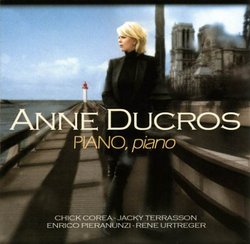CD Details
Synopsis
Album DescriptionProduced by Anne Ducros and Renato Lombardo, "PIANO, piano" is a stellar program of American jazz standards which feature such great guest pianists as Chick Corea, Jacky Terrasson, Enrico Pieranunzi, and Rene Urtreger, and Ducros? quintet of Benoit de Mesmay (piano and Fender Rhodes), Sal La Rocca (double bass), Manhu Roche and Karl Jannuska (drums), and Bob Franceschini (saxophone) supporting her lovely vocals. Ducros brings a fresh perspective to such widely revered jazz standards as "My Foolish Heart," "Body and Soul," "God Bless The Child," "Never Let Me Go," "You Go To My Head," "Just In Time," and "Naima." On "Gnossienne N° 1", Anne also displays her arrangement skills in her unique interpretation of Erik Satie?s classic, featuring Oliver Louvel on saz (Turkish lute). Ducros? voice is supple, smooth and inviting on both "You Go To My Head," and "Moon and Sand." She receives the perfect accompaniment from Enrico Pieranunzi?s delicate, beautiful comping as she reveals the discipline and dedication upon which she has built her extraordinary reputation. Ducros? warm, romantic voice pairs art and life in a passionate belief of jazz and emotion. Even though she premieres each song with a distinct new identity, Anne?s ensembles retain much of the original composer?s melodic and harmonic appeal. The renowned pianist Chick Corea accompanies Ducros on three songs including "Les Feuilles Mortes," which is sung in French. Here, Ducros showcases her highly acclaimed scatting and vocalese stylings, which also reflect the broader artistic scope of her range and phrasings. On "My Foolish Heart," the two create a refined complement of harmonic drama to once again broaden Ducros? passionate reading of this beloved Great American Songbook standard. Ducros? highly acclaimed countryman, pianist Jacky Terrasson accepted Ducros? invitation to join forces for the first time on "PIANO, piano" and their stunning performance on both "God Bless The Child," and "Never Let Me Go," reach the highest level of artistry and the artistic process. Their rendition of "God Bless The Child," exudes their sense of collaboration ? getting ideas from each and inspiring each other?s musicianship. "Never Let Me Go" seems to come from both within and across the considerable expertise both have gained in their art forms.
| |
CD Reviews
Uneven; But When It's Good... Rick Cornell | Reno, Nv USA | 09/07/2006 (4 out of 5 stars) "This c.d. has received some glowing reviews in other parts. I'm sure a big reason why is that Ms. Ducros performs here at different times with five of the top pianists in the world: Chick Corea; Enrico Pieranunzi; Rene Urtreger; her usual accompanist, Benoit DeMesmay; and the incomparable Jacky Terrason. Hence the name of the c.d.
Nevertheless, I respectfully dissent.
Listening to this c.d. reminds me of the difficulties of being bilingual in English and French. In my experience, it's much easier for American singers to sing Italian or German than French. Besides the nasally sound of French, the French sound centers on the "schwa." But, most singers are taught to sing brightly. Bright sounds better than dark.
Hence, when Ms. Ducros sings "Andjle" for "Angel", for example, or "Tree" for "Three", or "Body and Saul", or "Chenged" for "Changed", or "Intoxiket" for "Intoxicate", to name but 5 examples, the sound sticks out jarringly. Two more recent vocal jazz c.d.'s by European chanteusses which didn't have that problem were last year's album by Ilona Knopfler and the recent one by Roberta Gambarini. Both of them sounded like All-American Girls.
The problem is that jazz singing has to sound like the most natural thing in the world. When the mispronunciations litter a song like "Four", for example, it sounds stiff. "Four," one of Jon Hendricks' "odes to joy", simply doesn't work when done stiffly. Same thing with "Naima"; when you have to strain to figure out what her lyrics are, the "prayerful" qualities of this magic song become lost.
All of that said, this c.d. does have its moments. Most prominent is the wordless, middle-eastern vocalese flair of Satie's "Gnossienne No. 1." Ms. Ducros has a beautiful lower register in her singing voice, and if all of the cuts took advantage of that such as this one, she would have a superior album. (I'm less impressed with her upper register, though; on "Never Let Me Go", it sounded pinched.)
This is her second release, apparently. For Release #3, I'd strongly recommend that she either stick with stuff like the Satie, or if she's going to do "Great American Songbook" standards, get a vocal coach and drill pronunciations, over and over. RC"
|


 Track Listings (12) - Disc #1
Track Listings (12) - Disc #1